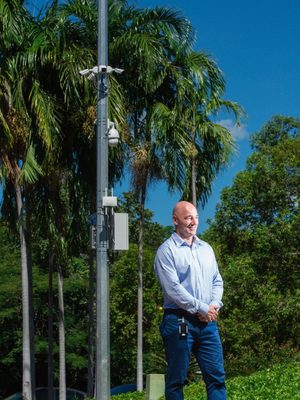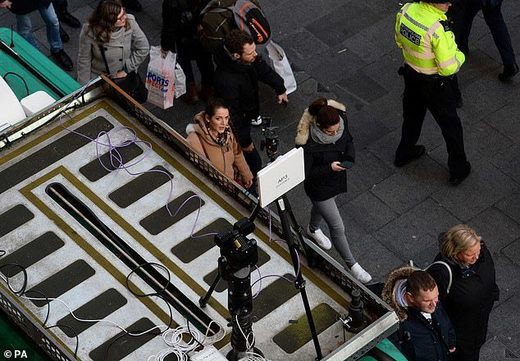China's 'Smart' surveillance tech arrives in Darwin, Australia
Will Zwar
NT News
Tue, 09 Apr 2019 03:12 UTC

© Glenn Campbell
City of Darwin GM for innovation , growth and development Josh Sattler as Darwin council are nearly finished installing smart street lights and smart park lights.
DARWIN council will use
Chinese inspired surveillance technology to gather data on what people are doing on their phones and to put up "virtual fences" that will instantly trigger an alert if crossed.
The concept for the "Smart technology" comes from Shenzhen and has seen facial recognition surveillance to create a controversial social credit system where people earn or lose points based on the way they behave.
Council's Innovation, Growth and Development Services general manager Josh Sattler said the
poles, fitted with speakers, cameras and Wi-Fi, would allow council to gain data on how many people walk on what footpaths and where they use certain websites and apps in the city.
"The artificial intelligence program will be watching, we won't be," he said.
"We'll be getting sent an alarm saying 'there's a person in this area that you've put a virtual fence around' ... boom an alert goes out to whatever authority, whether it's us or police to say 'look at camera five'."
The CCTV component of the poles will be rolled out by Anzac Day with the SmartCity platform to be finished by the end of financial year.
Mr Sattler said
Darwin would be the first city in Australia to adopt the technology.
"At the moment we're going off whoever screams the loudest and sometimes that doesn't represent the full voice of the community," he said.
"It's about having the data to make the informed decisions and we can get benefits for the rest of the community."
Mr Sattler said the next six months would see major changes to the technology and local businesses could be the big winners.
"(It will tell us) where people are using Wi-Fi, what they're using Wi-Fi for, are they watching YouTube etc,
all these bits of information we can share with businesses ... we can let businesses know 'hey, 80 per cent of people actually use Instagram within this area of the city, between these hours'," he said. "What does that tell a business? Get on Instagram between these hours, put up new posts, you'll connect with a lot more people."
Charles Darwin University law lecturer Dr Jenny Ng said people can have a technology friendly environment if they learn how to use it safely and have a better understanding of the different levels of privacy.
"It's only fair to tell the public if the
public wifi, for example, is less secure than a personal wifi," she said.
"In such cases, if you want to have a highly secure network with high privacy features on the Internet, you will have to use your personal wifi which employs such features."
Dr Ng said the purpose of the Smart techology wasn't for penalising pedestrians as had been seen in Shenzhen.
"Their intentions are different, they want to track your every move and come up with a social credit system," she said. "We don't have that system here, I don't think we're going to have it here anyway."
[Sure, it's totally different in the West...
Met police chief backs facial recognition technology that doesn't work 98% of the time]
Instead, CCTV could act as it did in other parts of society.
"We already use (CCTV cameras) in places such as banks, it's to create
safety systems and we don't object to it ... because we know it creates a safety system."
Comment: As with most technology, the real worry lies with who's operating it and for what purposes:



